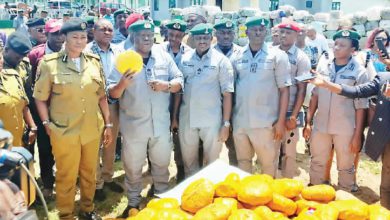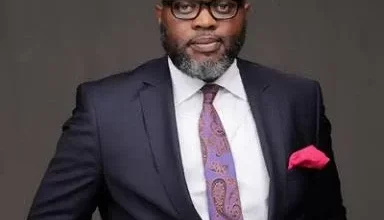Johannesburg no longer safe for Nigerians, attackers are well organised –President, Nigerian Union, South Africa
- We cannot quantify or ascertain how many have been injured for now. But according to the information at our disposal, only three people have been killed and they were killed during the fire that broke out yesterday (Sunday) morning in Jeppestown, Johannesburg.
President, Nigerian Union South Africa, Adetola Olubajo, speaks on the xenophobic attacks on Nigerians living in South Africa in this interview with TOBI AWORINDE
What culminated into the recent xenophobic attacks in South Africa?
Last Monday, there was a fight between some foreigners suspected to be Tanzanians and taxi drivers which led to the death of one taxi driver. So, on Tuesday, the taxi drivers went on a mass protest in the morning and it degenerated into violence. Some criminal elements joined them and they started looting and burning houses, business and shops belonging to foreign nationals in the Pretoria Central Business District on Lilian Ngoyi Street. The police were able to contain the situation but it spread to other parts and that is what we are still battling with till now.
Was there any loss of lives or people injured in the attacks?
We cannot quantify or ascertain how many have been injured for now. But according to the information at our disposal, only three people have been killed and they were killed during the fire that broke out yesterday (Sunday) morning in Jeppestown, Johannesburg. Their identities have not been revealed by the police and many people were injured but we cannot say, ‘this is the number of people that have been injured.”
Are the nationalities of the deceased known?
No.
But is there a probability that they were Nigerians?
No, I don’t think so. If they were Nigerians, we would have got that information. We have some presence of our union in the Johannesburg area; so I don’t think there is any strong probability that they would have been Nigerians because, if they were Nigerians, we would have got information about them.
How endangered are Nigerians living in that area at the moment?
They are not safe; no Nigerian is safe in that area, especially in the Johannesburg environs because these groups of attackers are very coordinated and organised. So, what they do is to target a particular area where foreign nationals are densely populated and not only Nigerians are targets; they target all foreign nationals. In that quest to attack foreign nationals’ businesses, loot them and burn them, some South Africans also are caught in the firing line because there were some South African businesses that were also looted mistakenly; they were mistaken to be those of foreigners. So, the aim is to attack the foreign-owned businesses. A lot of Nigerian businesses, like the car dealer’s shops and internet cafés, are counting their losses; they were looted and burnt down.
Can you give the value of property lost?
It is in millions. Yes, because when you talk about a car dealer that has lots of cars in its garage, computer accessory business, those buying and selling wholesale stock, it’s in millions. There is no way it will not run into millions of rand.
Do you know how many Nigerian business owners were affected?
 We are still compiling that list. There are about eight of them that have come forward, but we are still compiling that list. A lot of them are traumatised already and it is when they come forward that we will know. For some of our people that have moved and are living around Jules Street in Malvern, even in Jeppestown, it is very risky for them to move around because the situation is very tense as we speak.
We are still compiling that list. There are about eight of them that have come forward, but we are still compiling that list. A lot of them are traumatised already and it is when they come forward that we will know. For some of our people that have moved and are living around Jules Street in Malvern, even in Jeppestown, it is very risky for them to move around because the situation is very tense as we speak.
Has the Nigerian Mission been supportive enough?
They are aware of what is happening; so, we expect them to do their job. But their core function is to protect the lives and properties of Nigerians, so they need to come out in the field and give support to Nigerians.
But would you say the Nigerian Mission has given adequate support in the past?
In the past, it has been media statements and rhetoric that something will be done. Whatever things that are being done by them, if there is no positive result, we would say something different needs to be done. We believe that if they are giving adequate reports to the government and giving correct advice on how to use some diplomatic instruments to solve this problem, this attack would have gone down. So, we implore them to do more. Whatever they are doing is not working, so they need to do more.
The Minister of Foreign Affairs, Geoffrey Onyeama, during his ministerial screening suggested that a hotline should be set up to shorten the response time of Nigerian missions. Do you think that could solve the problem of the xenophobic attacks against Nigerians?
That is a welcome idea because that will enable the foreign affairs to get direct information from the victims, so the people that encounter the ordeal can narrate their stories directly to the ministry. But they need to do more; there are so many diplomatic instruments available that they can use to push the South African government so that they will be able to take decisive steps to stop these incessant and outrageous attacks on foreign nationals.
The long-years, hard-earned investments of people are being destroyed in minutes. Some people have been building their business for years — some of them, 10 years, and others, more than that — and they are just destroyed within a space of 30 minutes to an hour. It is making life difficult for our people, so we are calling on the Federal Government, through the Ministry of Foreign Affairs, to step up and put some pressures here and there. There should be serious engagement in finding lasting solutions to these outrageous attacks and looting.
 Our government representatives in South Africa should also not be seen to be reactive; they should be proactive. There is so much intelligence that is available. Sometimes, we ignore the information and signals, so when they come, we start running helter-skelter, which is not correct. They need to be proactive in terms of solving the problems of our community members.
Our government representatives in South Africa should also not be seen to be reactive; they should be proactive. There is so much intelligence that is available. Sometimes, we ignore the information and signals, so when they come, we start running helter-skelter, which is not correct. They need to be proactive in terms of solving the problems of our community members.
A lot of nerves are frayed due to the losses incurred. How should Nigerians handle the conflict so that it will not escalate?
First of all, every Nigerian in South Africa — those who have businesses, those who are not affected and those who are — should always be mindful and vigilant of their safety. It is very important. We cannot say that South Africa is safe for anybody now because the attack is not being done in one place. It is spreading minute by minute, hour by hour, to different parts. So, we would implore our people that are at home to, please, use any means available to them to reach our government at the highest level to engage their counterparts, so that they can stop these unnecessary and senseless attacks on our people.
Those who are there also need to be good ambassadors. We should not give them (South Africans) reasons to attack us and we need to cooperate with the South African police to be able to root out crime from our community. Whoever commits a crime, whether South Africans, Nigerians or non-citizens, they should face the full wrath of the law. There should be deterrent for every action that is not within the law. Then, this issue of attacks and killings can actually be reduced.
Those who are attacking are on the premise of trying to solve crimes; it is unacceptable and senseless because you cannot use crime to solve crime. How do you say you are solving crimes, then you are looting and burning people’s businesses? The people whose businesses you are looting are not drug dealers. The drug dealers have gone into hiding; you cannot then go on the rampage and start looting people’s things. Crime cannot be used to solve crime. We should all work together as Africans to root out criminal activities in our various communities.



